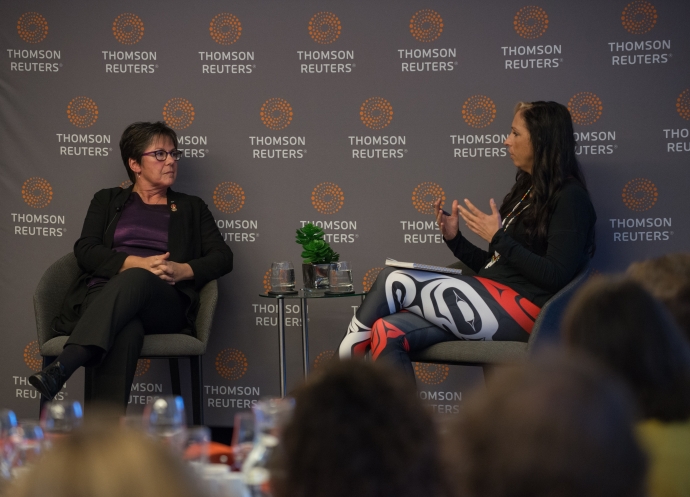"Warrior ally" Senator Kim Pate and Dr. Pam Palmater discuss women and the penal system at PBSC's conference dinner
Story by Jessie Stirling, 2L / Photos by Laura Pedersen
Senator Kim Pate, in conversation with Mi’kmaq lawyer and advocate, Dr. Pam Palmater, was the special guest speaker at the Pro Bono Students Canada (PBSC) annual National Training Conference held on May 24, 2018. PBSC, founded at the Faculty of Law in 1997, and still headquartered at the law school, hires 50 law students each year from 22 schools across the country to run its local programs. Those students participated in a rigorous three-day training program which kicked-off with a dinner that includes PBSC friends, partners, and funders.
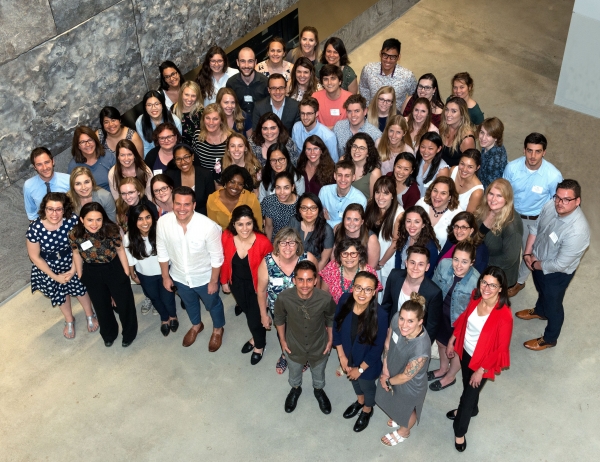
PBSC 2018-2019 students, on-site supervisors and the National Office Team
Amanda Carling, JD 2013, the Faculty of Law’s manager of Indigenous initiatives, opened the event, acknowledging the traditional and sacred lands upon which the attendees were gathered – lands that for thousands of years have been home to the Huron-Wendat, the Seneca and the Mississaugas of the Credit River, and remain home to many Indigenous peoples from across Turtle Island today.
Carling also thanked PBSC for the efforts it has made to develop programs with and for Indigenous communities. In 2015, the Truth and Reconciliation Commission offered concrete ways to redress the impact of residential schools. PBSC committed to contribute to the reconciliation project and respond to the Calls to Action by creating two dozen new projects that serve Indigenous communities across Canada.
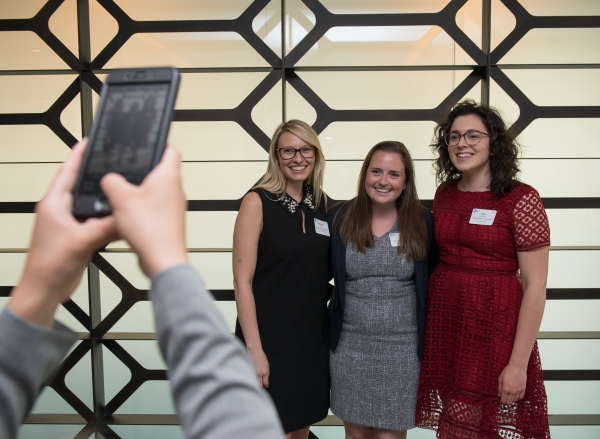
Neil Sternthal, managing director of Thomson Reuters, a long-time national partner of PBSC and generous host for the evening, welcomed the audience and congratulated PBSC for recruiting and training a “righteous army” of law student volunteers who can provide essential legal services to people in need.
“If I had experienced this event as a student,” said Mary Wahbi of Fogler Rubinoff LLP, a longtime PBSC volunteer lawyer, “I would have had a difficult time going into private practice.”
PBSC board member Kirby Chown, LLB 1979, spoke next. Her deep commitment to law student pro bono spans more than a decade. It was under Chown’s leadership in 2004 that McCarthy Tétrault became PBSC’s first national partner, “one of the first decisions I got to make as Ontario regional managing partner.” She added: “What an easy decision it was.” She called PBSC an “inspiring organization” and celebrated the leadership since 2010 of Nikki Gershbain, LLB 2000, national director of PBSC. Chown then introduced the evening’s two inspiring guest speakers.
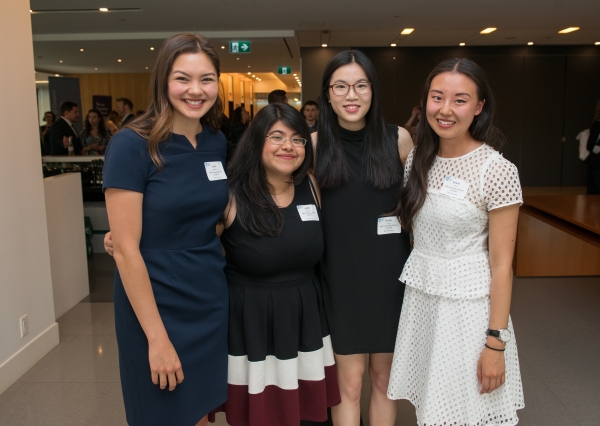
Senator Kim Pate has spent the last 35 years working in and around the legal and penal systems of Canada, with and on the behalf of some of the most marginalized and vulnerable members of our society. Dr. Palmater said it best when she described Pate as “a warrior ally”, whose advocacy continues today from her Senate seat. After serving for many years as executive director of the Canadian Association of Elizabeth Fry Societies, and then as a law professor at the University of Ottawa, Pate was appointed as an independent senator in 2016.
As a senator, Pate continues to be one of the foremost advocates for people in prison, most recently tabling legislation that would allow judges to decide whether they should impose mandatory minimum penalties on offenders at sentencing time.
Speaking about the particular issues women in prison face, Pate and Palmater agreed that there is generally very little reason to incarcerate women, because “if they’re not in the situation where they’re negotiating poverty or violence, the chances of them being a risk to anybody is virtually nil.” About half of incarcerated women wind up behind bars on offences of personal violence, but as Pate noted “virtually every act is reactive, and much of it is defensive.” The criminal justice system consistently fails to acknowledge that “the way that a woman might have to defend herself or react to violence is very different from how a man might react to violence.”
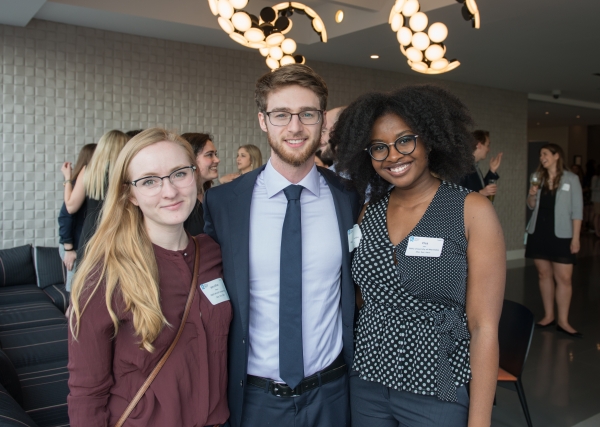
Pate also observed that two-thirds of female prisoners are mothers, and most were the sole supports for their kids before they went to prison. The practice of incarceration has a profoundly negative impact on children, with “90 per cent of kids ending up in the care of the state.”
Palmater then ask how the prison experience is different for Indigenous women. Pate explained that Indigenous women are “under-protected but over-policed,” representing 40 per cent of all females in federal prison but only five per cent of the national population. In federal prisons, one in every five Indigenous women attended a residential school, two-thirds came to prison directly from the foster care system, and 91 per cent have experienced physical or sexual abuse.
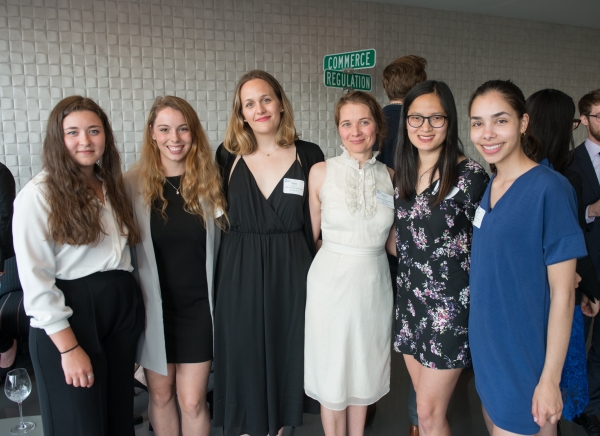
Pate also explained that while “women in particular are massively over-segregated,” Indigenous women are further overrepresented in this group. Segregation units, or “prisons within prisons” as Palmater put it, are indistinguishable from the conditions of solitary confinement. Prisoners spend up to 23 hours a day in pods, experiencing limited human contact.
Dedicated to using her Senate platform to work on behalf of incarcerated individuals, Pate joked: “One of my favourite things about my new job is I’m taking senators to jail”. She added: “The argument I’ve been making to senators is, if you’re going to be passing these laws, you better come and see where the people are going.”
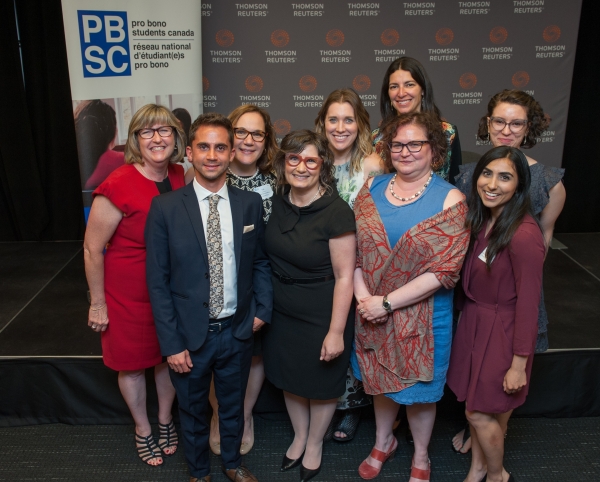
PBSC National Office Team
In her closing remarks, Gershbain thanked Pate and Palmater for a candid, powerful discussion and for inspiring the law students. But it wasn’t only law students who felt inspired.
“If I had experienced this event as a student,” said Mary Wahbi of Fogler Rubinoff LLP, a longtime PBSC volunteer lawyer, “I would have had a difficult time going into private practice.”

